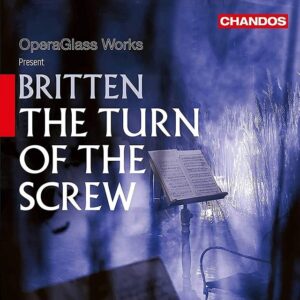GRAMOPHONE Review: Britten The Turn of the Screw (DVD) – Soloists, OperaGlass Works, Sinfonia of London/Wilson
 How inspired of OperaGlass Works’ founders Selina Cadell and Eliza Thompson to identify Wilton’s venerable Music Hall as the perfect environment in which to reimagine Britten’s masterpiece The Turn of the Screw. But the projected run of live performances – featuring the reborn Sinfonia of London under John Wilson – fell foul to Covid and that, one might have imagined, was that. Not a bit of it. Chandos and OperaGlass Works saw their way to salvaging something even more magical from a disastrous situation – and they made this film instead.
How inspired of OperaGlass Works’ founders Selina Cadell and Eliza Thompson to identify Wilton’s venerable Music Hall as the perfect environment in which to reimagine Britten’s masterpiece The Turn of the Screw. But the projected run of live performances – featuring the reborn Sinfonia of London under John Wilson – fell foul to Covid and that, one might have imagined, was that. Not a bit of it. Chandos and OperaGlass Works saw their way to salvaging something even more magical from a disastrous situation – and they made this film instead.
So as we follow Robert Murray (Prologue/Quint) through the weathered front door of the venue into a world of shadows and distressed surfaces, dust sheets and detritus, we are already deep inside the psychology of the piece. A grand piano emerges from the gloom and Prologue plays that fateful arpeggio which, so to speak, begins unlocking the mystery and its terrible consequences. Directors Dominic Best, Cadell and Thompson don’t hide from the pretence of their film but rather expose the ‘innards’ of it with visible stage crew and musicians busily spiriting us through those extraordinary interludes where Wilson’s Sinfonia of London musicians etch in exquisitely atmospheric half-lights of their own. The whole performance is so beautifully ‘heard’.
The natural world, too, is drawn into this spooky environment through the tree-lined gallery of Bly/Wilton’s and amidst the bull rushes where we can imagine the sinister lake beyond. The ghost of Peter Quint is spied not just through windows and in mirrors but on one occasion, unexpectedly, shockingly, on a video monitor too. When the Governess (Rhian Lois) sings ‘lost in my labyrinth’ the close up on her troubled face is like reading her mind. Just as the piece is all shadow and suggestion so too is this filmic realisation.
You might remember Michael Winner’s rather sensationalistic movie The Nightcomers where Quint and Miss Jessel’s illicit affair (to which Miles and Flora were privy if not actively complicit) was explicitly sado-masochistic. That chimes well with the ‘knowingness’ of Leo Jamison and Alys Mererid Roberts’ performances as Miles and Flora. And the sensational Miss Jessel of the Nigerian/American soprano Francesca Chiejina which is full of sexual electricity.
Robert Murray is quite marvellous as Quint, mellifluous in his haunting melismas and vivid in his relish of the text. Rhian Lois conveys a steely resolve behind the softness. When she releases her anguish in the intense reprise of Miles’ ‘Malo’ song her solitude is chilling. So too is the unforgettable image of the damaged Miles at the close, not dead at the Governess’ feet but sitting alone in perpetual solitude.
The ceremony of innocence is indeed drowned.
You May Also Like

COMPARING NOTES: Musical Theatre Stars @ Pizza Express Live Holborn
28/01/2020
COMPARING NOTES: Julian Ovenden in Conversation
18/08/2020

